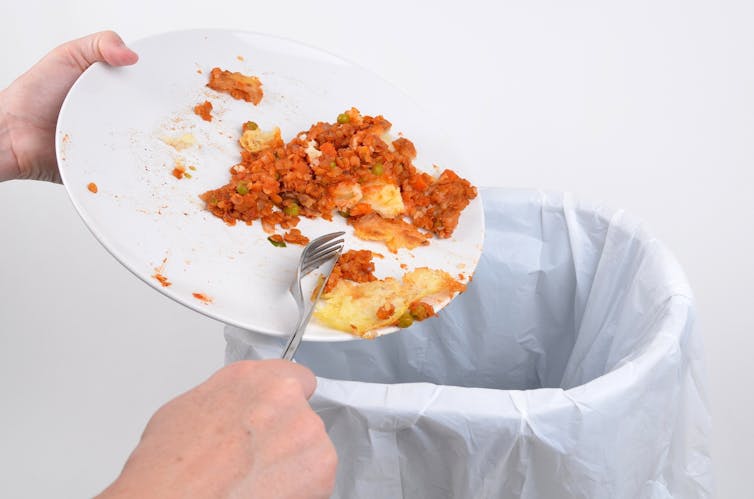Christmas at our place is all about family and fun, but most of all food. Our table groans under the weight of the rich, festive treats. But come afternoon, we’re groaning too – our bellies overfull, and the fridge stuffed with glad-wrapped leftovers.
As Boxing Day slides past, containers start to emit questionable aromas. By New Year’s Eve, the ham has turned green and nobody will brave a turkey sandwich. The bin beckons.
Tis the season to over-eat, waste food or both.
But if we’re honest with ourselves, the over-eating and wastage happens all year round.
Year-round food waste
The average Australian throws out 361 kilograms – approximately 72 Christmas turkeys worth – of food each year. At the same time, the UN’s Food and Agriculture Organisation (FAO), says that globally we need to produce 70% more food by 2050 to feed a likely population of 9 billion.
This figure is frequently repeated in reports and discussions about our future food security, along with whether we’ll have enough land, water and fertilisers to do so.
So how can we reconcile chucking out our excess ham with this need to produce so much more?
We already grow enough to feed the world
Globally, we produce 50% more food than we consume, meaning we could actually feed 10.5 billion people.
We could feed 12 billion people if we include all the edible crops that are used to produce biofuels.
Although not all of this food is getting to the people who need it, we actually already produce enough food to “feed the world”, even in 2050.
Where is the missing food?
Firstly, many of us eat too much (obesity epidemic, anyone?).
Any food that is consumed above a person’s energy requirements represents avoidable greenhouse gas emissions, unnecessary use of natural resources, and pressure on biodiversity.
Most of the excess food we eat is energy-dense, nutrient-poor and highly processed “discretionary” food (ahem, shortbread). Producing these foods not only uses valuable resources for little nutritional gain, but eating so much of them causes big health problems.
We also produce a lot of food that simply never gets eaten.

The FAO estimates that 30% of all food produced for human consumption gets wasted. Just a quarter of this wasted food would be enough to feed the hungry worldwide.
Producing and disposing of this wasted food uses dwindling resources and is a significant source of greenhouse gases – which contribute to climate change. Globally, the carbon footprint of wasted food that is produced and not eaten is 3,300 million tonnes of greenhouse gases per year, which is higher than the annual emissions of every country except for the USA and China.
Why do we need more?
If we already produce, eat and waste more than we need, why this insistence on a 70% increase in production? Well, that’s the meat (or turkey) in the sandwich – it is necessary largely to meet the needs of our changing diets, rather than to supply a growing population.
As people get wealthier, they generally eat more, particularly meat and dairy products (brandy butter, nom).
Globally, many of these livestock animals will be fed with grain - a far less efficient conversion of resources into energy for human intake, than eating the grain directly. Much of the required increase to meet “needs” in the global 70% target is to produce grain for feeding these livestock rather than people.
Commonly proposed solutions to increase grain production include providing farmers with “better” seeds that produce high-yield crops or with agro-chemicals – such as fossil fuel based fertilisers and pesticides – or increased farm mechanisation.
Who benefits?
Over the past few years, large amounts of money from the developed world were pledged to developing countries to alleviate food crises. In May 2008, the World Bank launched a US$1.2-billion emergency finance facility to provide funds for the “rapid provision of seeds and fertilisers to small farmers”.
Around the same time, the European Commission proffered €1 billion to pay for “fertilisers and seeds to help poor farmers in developing countries”. Not to be outdone, the US offered US$1 billion in food crisis money to increase “shipments of food, fertilisers and seeds to countries in need”.
Large agri-businesses are the main beneficiaries of these policies. Globally, 75-90% of grain production is controlled by four agri-business corporations – Archer Daniels Midland (ADM), Bunge, Cargill and (Louis) Dreyfus - which also trade in agricultural chemicals.
DuPont, Monsanto, Syngenta and Limagrain control 29% of the world market in seeds, with Monsanto controlling almost all of the genetically engineered varieties.
The influence of agri-business on global food policies has been openly criticised by the International Assessment of Agricultural Knowledge, Science and Technology for Development (IAASTD) (the agricultural equivalent of the IPCC, but with non-governmental input too), as well as other organisations.
They suggest that food-crisis-inspired “seed aid” is just a way to get corporate seeds, fertilisers and, surreptitiously, market systems into poor countries.
They also argue that industrial food production in its current form will not be able to adequately feed the world in the long term, especially since current practises have increased hunger and malnutrition in some places, contributed to obesity in others, are using up resources and contribute to climate change.
A small-scale solution
IAASTD and other leading expert bodies have called for a radical change to food policy and how our food system operates, to ensure our future food security. UNCTAD, Oxfam, Rabobank and even a recent blog post in The Economist also all push for a more holistic and systemic approach to agriculture and food production.
This means moving towards small-scale, diverse, agro-ecological methods and away from our conventional monoculture-based and agro-chemical dependent system.
Simply focusing on increased yields will primarily benefit trans-national corporations, rather than hungry people.
For a healthier and sustainable future, we must radically re-think how we produce, consume and value food and how resources can be used for the most nutritional benefit.
Otherwise we may be literally eating away at our ability to, well, eat. So when you’re stocking up on “essentials” this festive season, spare a thought for the planet and choose wisely. Maybe when you’re drafting your New Year’s resolutions, consider changing your eating habits for life - not just for Christmas.

